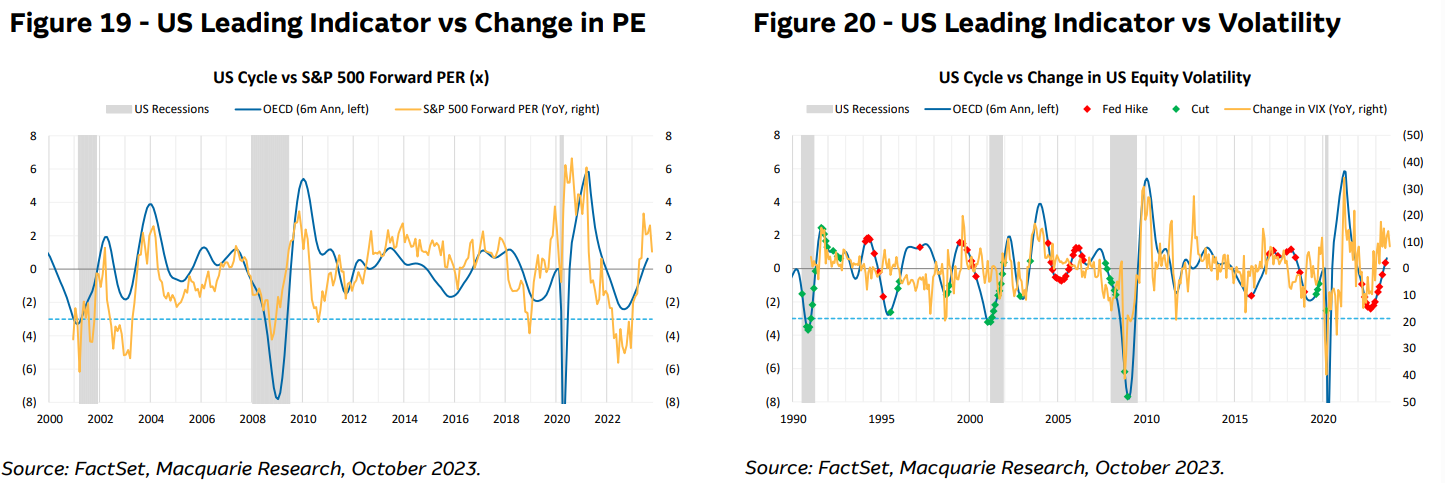Macquarie is adding risk with these 9 ASX stocks
A year ago, markets were tanking and there was very real concern we were about to enter a recession – if not then, it was thought to be imminent and in 2023. There’s a reason why many fund managers have discussed the most anticipated recession ever – and it keeps getting pushed back. Like many, Macquarie positioned its Australian equity strategy defensively. In a note released today, it now admits it went too hard on defensive positioning and is taking on more risk. Taking things a step further, the millionaires’ factory now believes we are in an expansionary mini-cycle which is likely to last another 2-3 months.
That’s not to say that Macquarie believes we’re out of the woods as far as a recession goes. It’s just a matter of market conditions kicking the can further down the road.
An expansionary cycle and what that means for recession
Macquarie points to the OECD indicator as one of the tools behind the view of the market being in an expansionary phase. It’s not a new economic expansion, rather an expansion-like phase. What that means is that we’re not in the start of a new bull market surging for years, but rather a temporary bounce that will eventually run out and lead to a downturn.
The evidence for an expansion phase includes a few factors:
- The US equity PE is up 3x since 2022 lows and volatility has decreased.
- Cyclicals have outperformed defensives in the recent reporting season – as it is typically seen in an expansionary phase.
- The labour market has been resilient. You typically don’t see large increases in unemployment in expansionary phases.
- Returns in the ASX are most correlated to the recovery and expansion phases of the market.

Off the back of this, Macquarie believes a recession is not imminent… yet.
Based on OECD data, no US recession since 1960 has started in an expansion phase. For the majority of recessions, there is typically around 2 months of a downturn and an 8 month average of downturn before a recession occurs.
According to Macquarie, we are about 4 months into the expansion phase, and the bank believes we have around 2-3 months left of this risk-on phase before we’ll move into a slowdown phase. From there, it argues the earliest timing for a US recession would be July 2024 but Macquarie believes September 2024 – January 2025 would be the most likely period for it to start. Unless of course, there is an intervening event that pushes back timing again.
When it comes to an actual recession, the investment bank suggests we are at risk of a hard landing based on tight credit situations. While the credit situation could ease, the flip side is that central banks may use further hikes to manage any gains in inflation in this expansionary phase.
Converting the market environment to investment allocations
Although Macquarie thinks there is a slowdown coming in a few months, it believes it went too defensive and needs to add risk back in to capture the expansionary phase.
“Our best guess is the current Expansion lasts 2-3 more months, then we shift to a Slowdown phase which often sees a rotation back to defensives.
So, while we reduce our defensiveness because a recession is not imminent, we would not add significantly to highly cyclical stocks, especially those with weak balance sheets or low liquidity,” said Macquarie Australian Equity Strategist Matthew Brooks.
Key increases have been in financials, mining and small caps. It has reduced its exposure to defensives and bond proxies given the expansionary phase and view of a later date for a US recession.
It expects commodities to be supported by the market cycle, along with the China credit impulse with key increases to BHP (ASX: BHP) and ALS Ltd (ASX: ALQ). Financials favour insurance, including Insurance Australia Group (ASX: IAG) and Suncorp (ASX: SUN). Three small caps have been added to the broader strategy including AUB Group (ASX: AUB), Bapcor Ltd (ASX: BAP) and Pexa Group (ASX: PXA).
Macquarie has maintained healthcare as its top overweight position, with a preference for CSL (ASX: CSL) and Resmed (ASX: RMD) on the basis of their balance sheets.
On a final note, the investment bank anticipates the expansionary phase to be beneficial for the Australian dollar. This is because typically the US dollar weakens in expansionary phases and strengthens as a defensive asset in downturns so in theory, should weaken in the next few months.
3 topics
9 stocks mentioned

